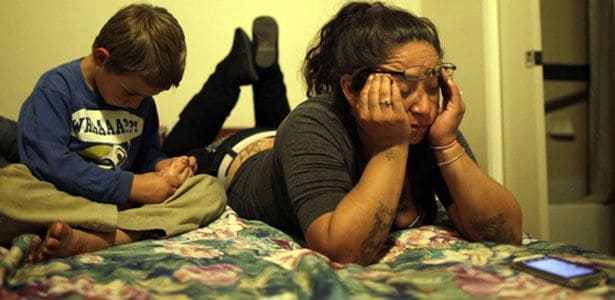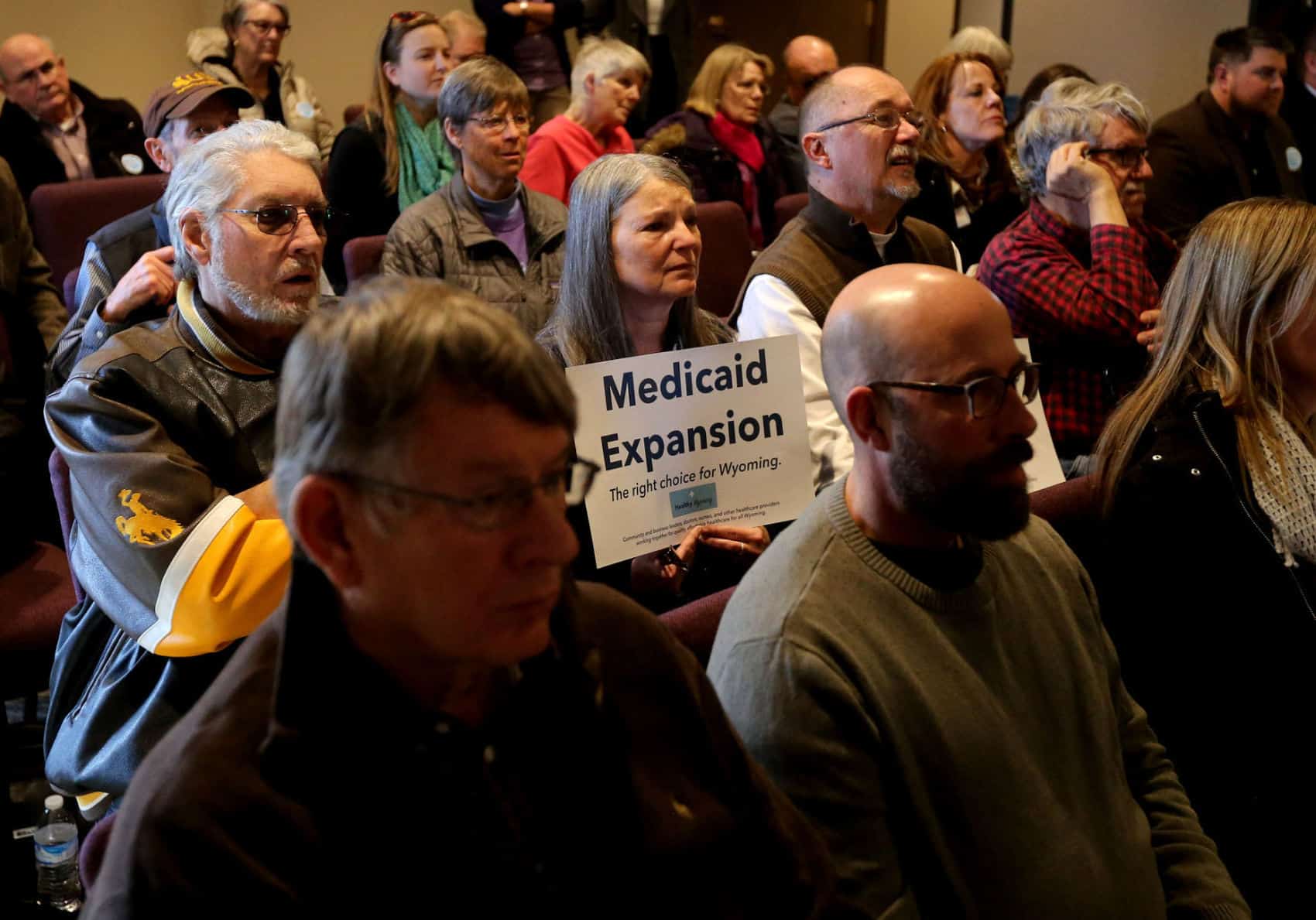Medicaid work requirements didn’t pass this year, but they fit too well with Wyoming’s history of denying public assistance to assume they won’t be back
Wyoming lawmakers love to make it as hard as possible for people to receive public assistance.
That’s one big reason people leave Wyoming when they lose their job—there’s simply no support here to help folks get through tough times and land on their feet.
But even the Wyoming Legislature, with its shameful track record of refusing to expand public healthcare access, had never before the 2018 session considered denying people Medicaid assistance on the grounds that they weren’t working enough. After all, people need to be healthy to find and keep a job.
This year, however, legislatures across America considered proposals that would force people to meet “work requirements” in order to enroll in Medicaid and the Supplemental Nutritional Assistance Program (SNAP; previously called food stamps).
The Wyoming Legislature was one of them. Thankfully, lawmakers resisted this disgusting bandwagon when a House committee killed a bill that would have brought work requirements to the state. But our politicians have a history of making the public safety net as small and weak as possible. As long as Medicaid work requirements remain a national trend, they will continue to be a threat to the well being of Wyoming residents.
The real intent is to shrink public support programs
Senate File 97, the work requirements bill proposed in Wyoming this year, was sponsored by Sen. Larry Hicks (R-Baggs) and written by the American Legislative Exchange Council (ALEC). The bill passed the Senate with a 25 – 5 vote before dying in a House committee.
Hicks and ALEC tend to support policies that make life hard for poor folks—they assume that people struggling with money are morally suspicious, and thus must be closely monitored and kept under wraps. Medicaid work requirements are meant to ensure that able-bodied people aren’t “gaming the system” and getting healthcare when they’re not supposed to (since, you know, when most people lose their job the first thing they do is begin to concoct devious schemes, instead of looking for work).
Study after study has shown correlations between Medicaid support and the eventual achievement of higher incomes, decreased medical debt, and cutting poverty.
Several state legislatures around the nation accepted these arguments—Kentucky, Indiana, and Arkansas all implemented Medicaid and SNAP work requirements earlier this year. In doing so, they fundamentally bastardized these programs’ intent—no longer are these states focused on using the programs to help alleviate poverty, but on kicking people off the rosters and shrinking the programs until they’re assisting as few citizens as possible.
This shrinkage was the intent of Wyoming’s 2005 law that requires welfare recipients to work, which cut the number of people receiving support by 90 percent.
The people it would punish
The Wyoming bill, SF-97, mirrored the Kentucky proposal (which is currently being challenged in court). It aimed to make Medicaid recipients work, go to school, volunteer, or be in a training program for a total of 80 hours per month. Medicaid enrollees who are elderly, pregnant, mentally or physically disabled, or children would have been exempted from the requirements.
Wyoming Department of Health Director Tom Forslund told the House Health, Labor and Social Services Committee—which ultimately killed SF-97—that the work requirement bill went after “the poorest of the poor” in Wyoming. Three-fourths of those targeted would have been single mothers who make $873 a month or less, and the proposal provided no help with childcare or transportation that would be needed for them to work or attend school.
Anyone found in violation of the proposed law would be kicked off Medicaid and SNAP for 12 months.
Forslund didn’t provide specific examples of the types of people in Wyoming the law would affect. But the plaintiffs in Kentucky’s lawsuit give an idea:
- A 62-year-old man who’s retired because he can’t be on his feet all day anymore, receives $841 per month in Social Security, and uses Medicaid to cover his diabetes, arthritis, high blood pressure, and cataracts
- A 52-year-old car repairman whose wife cleans houses and cares for their infant granddaughter and neighbor’s child, who rely on Medicaid for migraines and high blood pressure
- A 34-year-old mother of four who currently works as a housekeeper with varying hours, and for whom Medicaid provides treatment for chronic pain related to arthritis and a congenital hip condition
- A 39-year-old classical musician who relies on Medicaid for preventative care
It’s easy to imagine the Wyoming version of these Kentucky residents for whom disenrollment from Medicaid would mean an end to their access to healthcare.
Public healthcare—not work requirements—helps folks out of poverty
Sen. Hicks and his SF-97 co-sponsors argue that Medicaid work requirements help pull people up out of poverty—they envision a class of lazy poor people who just need the threat of no medical care to get them motivated to work.
During debate over SF-97 on the Senate floor this session, Sen. Charlie Scott (R-Casper), a co-sponsor, said work requirements amounted to a “helping hand” for people to get a job.
In fact, according to a study by the Kaiser Foundation, the vast majority of nonelderly adults in America who do not receive Social Security disability benefits and who are covered by Medicaid come from working families, and the majority work themselves. The cluster of plaintiffs in the Kentucky case illustrates this fact.
Furthermore, while work requirements don’t appreciably help people escape poverty, Medicaid definitely does. Study after study has shown correlations between Medicaid support and the eventual achievement of higher incomes, as well as decreased medical debt. A 2014 analysis found that access to health insurance, including Medicaid coverage, directly contributed to cutting poverty by almost one-quarter.
On the other hand, work requirements can cause working people to lose their Medicaid coverage. People who work low-wage jobs—i.e., the people most likely to receive Medicaid—are more likely to have irregular hours or gaps in their employment. Under SF-97, one month without meeting the minimum 80-hour quota would have them booted off the program for a year.
Sen. Charlie Scott (R-Casper), a co-sponsor, said work requirements amounted to a “helping hand” for people to get a job.
Many major physician organizations—including the American Medical Association, American Academy of Family Physicians, American Academy of Pediatrics, American College of Obstetricians and Gynecologists and the American Psychiatric Association—oppose Medicaid work requirements.
Why do we need bills like this? (We don’t.)
Wyoming is one of 28 states that chose not to expand Medicaid to childless adults under the Affordable Care Act. Expansion would have provided health insurance to 17,800 new enrollees in Wyoming. About 60 percent of people in that group are already working and 15 percent are disabled or too sick to work.
Which begs the question: Why do we need bills that mandate work like SF-97 if a majority of eligible enrollees are employed at least part-time? The number of people who would be affected is estimated at only 3,300, and three-fourths of those folks are single mothers barely scraping by as it is. Isn’t there a better way to improve their lives than threaten to take away their health care?
It appears that establishing work requirements for Medicaid and SNAP recipients in Wyoming is a solution to a problem that does not exist. As long as the state has the ability to determine if it will have work requirements and it is not forced to do so by the federal government, Wyoming should continue to use logic and compassion on the issue and say “no thanks.”






